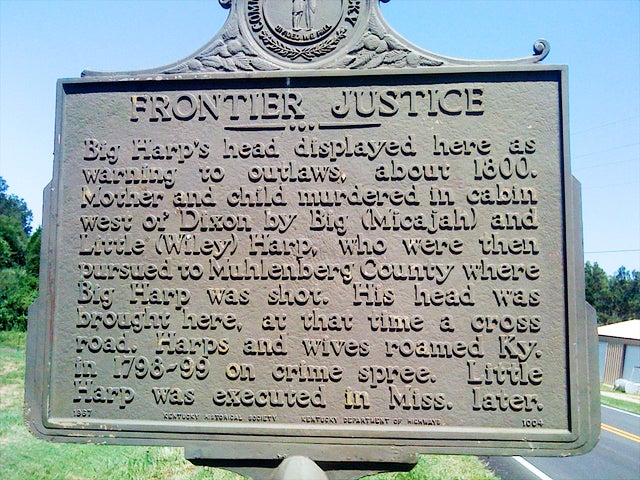Micajah and Wiley Harpe Part I: Frontier serial killers
Published 4:58 pm Friday, March 3, 2023

- Big Harp and Little Harp sign on 41A near Dixon. (Photo by Ron Jenkins)
|
Getting your Trinity Audio player ready...
|
BY JADON GIBSON
Contributing columnist
If Micajah and Wiley Harpe were alive today and relived their exploits of the late 1700s, their names and pictures would be plastered in post offices and bannered on television newscasts across the nation.
Micajah was born in North Carolina in 1768 and Wiley was born about two years later. Their father fought for the British in the early years of the war before changing coats when it appeared it would prove beneficial. Those who knew the senior Harpe turned him in to authorities and he was forced to flee for his life. Micajah and Wiley stayed behind with their mother.
The boys were outcasts as they grew up poor and were frequently embroiled in fisticuffs. They stooped to thievery instead of gainful employment. Micajah grew up to be a large, dark-skinned, unkempt man. He seemed to always have a bad disposition.
Wiley was smaller, fair-skinned and looked to gain his advantages in life by deception. Their upbringing and lack of social skills and employable talents tied them together for life even though it was short-lived. Wiley was always available to come to Micajah’s aid and to do his bidding.
They left Carolina in the mid-1790s. Somehow, they had befriended two sisters and those who dealt with them said they were a good match for the Harpes. It is unknown if either ever married although the taller rawboned sister often said she was married to Micajah. Actually, he never differentiated between the two nor a third female who joined their traveling family.
The foursome made their way into Tennessee where they became friendly and lived with a group of Cherokee Indians. After a year or so they moved on and began preying on isolated pioneers and defenseless travelers on the wagon roads of early America.
In the spring of 1797 a young Methodist preacher by the name of William Lambuth, was riding along the Wilderness Road, perhaps thinking about an upcoming sermon. The trail was only wide enough for wagons to pass and little more.
Lambuth was surprised when a tall stranger appeared in front of him, commanding him to stop and get down from his horse. Micajah’s speech wasn’t precise but the preacher knew immediately that he was in danger and that he had best do his bidding. By the time he dismounted and looked up another shorter man (Wiley) had appeared from the thicket. Both were dressed in fringed buckskins commonly worn by Indians at the time.
Generally, men of the clergy could pass without harassment since they seldom had money. The Harpes took the clergyman’s horse and a pistol that he kept in the saddle holster for protection. They leafed through his Bible where many travelers hid paper money.
The Harpes were having their way, yet pastor Lambuth was becoming less uneasy and no longer feared for his life. It was a false assumption as the Harpes killed many men letting very few survive.
“Take my money but leave me with my horse and gun for protection against the bears and panthers,” he begged.
Micajah looked bothered as he looked up and into his eyes. He said nothing but the preacher shuddered feeling he had just met the devil himself.
“Just go,” he thought to himself. “Take what you will but leave me with my life and let me do God’s work.”
He was surprised to see three women approaching. They were poorly dressed. The women began helping the men bundle various items before disappearing back into the woods.
“We’re Harpes,” Micajah uttered before he, Wiley and the women followed with the preacher’s horse in tow. They soon disappeared into the forest.
Lambuth then realized that was the only words they had uttered except for the initial words to stop and dismount.
Eventually the young preacher arrived at his destination and told others about the encounter. It was probably the first crime the Harpes committed on their extended spree and the only one that didn’t end in murder.
The Harpes traveled on to Knoxville, a wild and booming young town at the time. They started a business, but soon reverted to thievery and had to make a quick exit on stolen horses. A posse followed but when the Harpes feared they would be be overtaken they released the horses and somehow escaped into the brush.
Editor’s note: Read more about the dreaded Harpes next week.
Gibson is a widely read Appalachian writer from Harrogate. His writings are both historical and nostalgic in nature and can be read frequently in newspapers in your area.
Thanks to Lincoln Memorial University, Alice Lloyd College and the Museum of Appalachia for their assistance.





